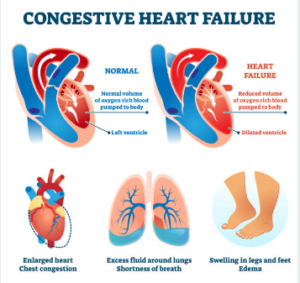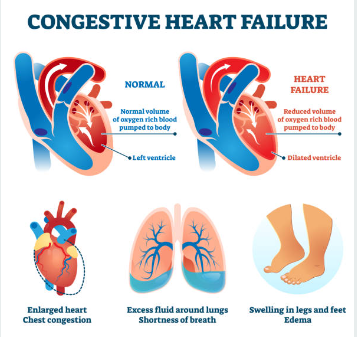
Congestive heart failure (CHF) is a serious condition where the heart is unable to pump blood effectively to meet the body’s needs. It affects millions of people worldwide, often resulting in chronic health issues and reduced quality of life. Understanding the causes of CHF is essential in both preventing the condition and managing it for those already affected. In this blog, we’ll explore the top five causes of congestive heart failure, shedding light on how each factor impacts heart function and overall health.
Let’s dive into the primary causes of congestive heart failure and what you can do to mitigate their impact. We will discuss how each of these factors contributes to CHF and offer insights into prevention and management strategies.
{ Also, read How Love Impacts Mental Health https://healthitudeplus.com/how-love-impact-mental-health/ }
High Blood Pressure (Hypertension)

High blood pressure, or hypertension, is one of the leading causes of congestive heart failure. When the pressure in your arteries is consistently high, the heart must work harder to pump blood throughout the body. Over time, this extra strain can weaken the heart muscle, leading to heart failure.
- Hypertension causes the heart’s left ventricle to thicken, a condition known as left ventricular hypertrophy. This makes it more difficult for the heart to fill with and pump out blood.
- Persistent high blood pressure also damages blood vessels, making them less flexible and more prone to blockages, which can further increase the risk of CHF.
Managing high blood pressure through lifestyle changes like regular exercise, a low-sodium diet, and stress reduction can significantly reduce the risk of heart failure. Additionally, medications such as ACE inhibitors and beta-blockers can help control blood pressure levels.
Coronary Artery Disease (CAD)

Coronary artery disease is another major cause of congestive heart failure. This condition occurs when the arteries that supply blood to the heart become narrowed or blocked due to the buildup of plaque, which is a combination of cholesterol, fat, and other substances.
- When the coronary arteries are blocked, the heart muscle doesn’t receive enough oxygen and nutrients, leading to ischemia (reduced blood flow) and damage to the heart.
- Over time, this damage can weaken the heart, eventually causing heart failure. CAD is responsible for a large proportion of heart attacks, which can directly lead to CHF by causing permanent damage to the heart muscle.
To reduce the risk of CAD, it’s crucial to maintain a healthy diet, avoid smoking, and keep cholesterol levels in check. Regular check-ups to monitor heart health, along with statins or other cholesterol-lowering medications, can also be beneficial.
Heart Attacks (Myocardial Infarctions)

A heart attack, or myocardial infarction, is a serious event that can directly lead to congestive heart failure. When a heart attack occurs, a portion of the heart muscle is deprived of oxygen, causing the tissue to die. This leaves the heart permanently weakened and less able to pump blood efficiently.
- The extent of damage from a heart attack varies, but even small infarctions can impair heart function over time.
- Multiple heart attacks, or large ones, significantly increase the likelihood of developing CHF, especially if the heart’s pumping ability is severely compromised.
Prevention of heart attacks is key to avoiding heart failure. This includes controlling risk factors like high cholesterol, high blood pressure, and diabetes. Aspirin therapy and other heart-protective medications may also be recommended for those at high risk.
Diabetes

Diabetes is a well-known contributor to cardiovascular disease and heart failure. People with diabetes are at higher risk of developing CHF for several reasons, including the effects of elevated blood sugar levels on the blood vessels and heart.
- Hyperglycemia (high blood sugar) damages blood vessels over time, increasing the likelihood of coronary artery disease, high blood pressure, and heart attacks—all of which are risk factors for CHF.
- Diabetes can also lead to diabetic cardiomyopathy, a condition where the heart muscle becomes stiff or thickened due to the metabolic effects of the disease.
Managing diabetes through proper diet, exercise, and medications like insulin or oral hypoglycemic agents is crucial to preventing heart complications, including CHF. Regular monitoring of blood sugar levels and cardiovascular health is important for individuals with diabetes.
Obesity and Sedentary Lifestyle

Obesity and a lack of physical activity are significant risk factors for congestive heart failure. Excess body weight puts a strain on the heart, forcing it to work harder to circulate blood. Additionally, obesity is often linked to other risk factors like high blood pressure, diabetes, and high cholesterol—all of which increase the risk of CHF.
- A sedentary lifestyle exacerbates the problem by weakening the heart and circulatory system, making it less efficient at pumping blood.
- Over time, the combination of obesity and inactivity can lead to cardiomegaly (an enlarged heart) and ultimately heart failure.
Maintaining a healthy weight through a balanced diet and regular exercise is essential for preventing CHF. Even moderate weight loss can reduce the risk significantly. Engaging in at least 150 minutes of moderate-intensity exercise per week is recommended to improve heart health.
Conclusion
Congestive heart failure is a complex condition with multiple causes, many of which are preventable or manageable through lifestyle changes and medical treatment. High blood pressure, coronary artery disease, heart attacks, diabetes, and obesity all play significant roles in the development of CHF. By understanding these risk factors and taking proactive steps to address them, you can reduce your chances of developing heart failure and improve your overall heart health.
Adopting a heart-healthy lifestyle, including regular exercise, a balanced diet, and regular check-ups with your healthcare provider, can make a substantial difference in preventing CHF. Medications, when necessary, should be used in conjunction with lifestyle changes to ensure the best possible outcomes.
By staying informed and making heart-smart decisions, you can significantly reduce your risk of congestive heart failure and lead a healthier, more active life.
Boost Your Heart Health with this 60-day Meal Plan

Heart Healthy Cookbook for Beginners: Quick and Easy, Low Sodium, Low Fat, and Low Cholesterol Recipes for Long-Term Healthful Living is the perfect companion for anyone looking to improve their heart health while enjoying delicious, easy-to-make meals. Whether you’re managing conditions like high blood pressure, or high cholesterol, or simply aiming for a heart-friendly diet, this cookbook offers a comprehensive guide to eating well without sacrificing flavor.
This cookbook includes a wide variety of low-sodium, low-fat, and low-cholesterol recipes, ensuring that you can take control of your heart health with meals that are both tasty and nourishing. Plus, the 60-day meal plan takes the guesswork out of healthy eating, offering a structured, easy-to-follow plan that can help you develop long-term habits for a healthier lifestyle.
Key Benefits:
- Heart-Friendly Recipes: Packed with easy-to-make dishes designed to help manage high blood pressure, cholesterol levels, and overall cardiovascular health.
- Low Sodium and Low Fat: Focus on reducing harmful ingredients while keeping meals flavorful, helping you maintain heart health without sacrificing taste.
- 60-Day Meal Plan: A structured plan to guide you through two months of heart-healthy meals, making it easier to stick to a balanced diet.
- Beginner-Friendly: Perfect for those new to heart-healthy cooking, with simple, quick recipes that fit into a busy lifestyle.
If you’re looking for a practical and effective way to protect your heart and enjoy delicious meals, this cookbook is a must-have. Take the first step towards long-term heart health today!




Pingback: 10 Powerful Health Benefits of Eating Onion You Need to Know